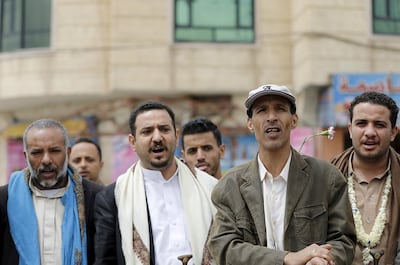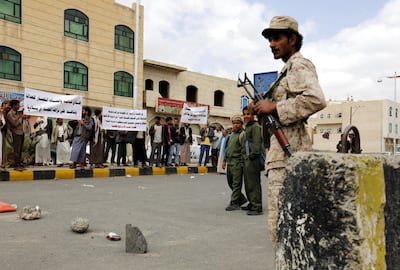Yemen's Bahais and the charges they often face
The Baha'i faith was made known in Yemen in the 19th century, first introduced by an Iranian man named Ali Muhammad Al Shirazi, considered the Herald of the Baha'i faith in 1844.
The Baha'i faith has had a growing number of followers in recent years despite persecution in Yemen and Iran.
Today, some 2,000 Baha'is reside in Yemen, according to Insaf.
"The 24 defendants represented by the House of Justice, which has intelligence outfits from the uS and the UK working to carry out an espionage scheme in Yemen under the guise of religion.. aimed to impant and found the Bahai sect on Yemeni soil by bringing foreign Bahais from abroad and homing them in Yemen," the charge sheet said.
Baha'Ullah, the founder of the Bahai faith, was exiled by the Ottoman Empire in 1868 from Iran to what is now Israel. Now, the Bahai faith's highest governing body, known as the Universal House of Justice, is based in the Israeli city of Haifa, which the Bahais turn towards during prayer.
The Houthis cite this as collective "evidence" of Bahai "links" to Israel - which the Houthis consider their enemy.
A tip-off about a Houthi-led raid gave Nadim Sakkaf's family minutes to pack up their life and run house-to-house through Sanaa before finally fleeing Yemen for the safety of Europe.
Mr Sakkaf, who was not in the country at the time, waited anxiously until his family made it out and they were reunited.
He is one of 24 Yemeni-Bahais accused of espionage by Yemen's Iran-backed Houthi rebels.
It is a claim rights groups and governments say is an orchestrated persecution of the religious minority, using fictitious allegations and inhumane detentions.
Houthi control over Yemen's most populous areas trickles into almost every area of ordinary life.
But the international community repeatedly sounds the alarm over the rebels singling out 0.5 per cent of Yemen's 30 million people – its religious minorities.
Mr Sakkaf is one of the small Bahai community accused of espionage, among a list of charges, and like many he fled the war-torn country, leaving everything behind.
The Houthis accuse the men, women and one minor who make up the list of 24 defendants, of using their religious worship as a guise for malignant activities.
Mr Sakkaf and others who were sent to Houthi jails, said that intimidatory tactics such as throwing them in cells with ISIS and Al Qaeda members are regularly used.
The Houthi-run National Security Bureau's charge sheet for the 24, seen by The National, accuses them of "operating for the Israelis as one cell".
It is an accusation the Bahais say is often levelled against their community because the religion's highest governing body, the Universal House of Justice, has long been based in Haifa, in Israel.
A history of abuse
Before the war began when the Houthis seizd Sanaa in 2015, Mr Sakkaf had a job as the deputy director of the British Council, a UK educational and cultural institution that works around the world.
He was later promoted to country manager in Yemen, continuing the role he filled in Malaysia until 2018.
The Sakkaf's family-founded NGO group also worked on social development projects with other agencies in rural areas.
Mr Sakkaf said this put him in the rebels' sights.
“They accused us of holding events and attempting to ‘indoctrinate’ the youth," he said.
Mr Sakkaf said he was repeatedly detained by the Houthis.
In 2016, they raided a workshop on social development and rounded up those taking part, among them his wife and sister-in-law.
“They called me and my brother to come so they could 'ask us a few questions'," Mr Sakkaf said.
"We knew there was a big possibility of us getting arrested too, but we went anyway, and sure enough, we were detained.”
Houthi interrogators accused him of being a spy for the British government because of his work. He was held after questioning.
"There were 42 of us in one cell, including eight or nine Al Qaeda members," Mr Sakkaf said.
“They threatened us in prison and mentioned that if we were released they would come after us.”
While most of the people arrested in the 2016 raid were released within a few hours or days, he languished for months in a Houthi prison.
Amnesty International, Human Rights Watch and the UN called for his release.
The UN Office of the High Commissioner for Human Rights said in 2016 that those captured in the sweep faced “harsh treatment” by the Houthi’s National Security forces.
“Interrogation of the detainees was mainly about the allegations of the source of funding of Bahai activities from Israel and the proselytisation of youth at the event,” the office said.
It said National Security extorted $14,000 from the families of Mr Sakkaf and his brother.
Months after his release, the Houthis went after his family home and the NGO's offices, raiding and looting them, he said.
While Mr Sakkaf and his family are now safe in Europe, the trial against him and 23 others, including his wife, continues.
In 2019, the US State Department voiced deep concern that the “Houthis continue to severely mistreat, arbitrarily detain and torture Bahais in Yemen".
"This persistent pattern of vilification, oppression and mistreatment by the Houthis of Bahais in Yemen must end," said spokeswoman Morgan Ortagus.
Amnesty International called the Houthis’ accusations bogus and the US Bahai Office of Public Relations made similar comments.
"This sham trial is nothing short of an embarrassment, having been condemned by all corners of the international community and the media," Anthony Vance, director of the US Bahai Office of Public Affairs, told The National.
Protecting Minorities
Yemen's minorities are not alone in their struggle. Eman Homaid runs Insaf, an organisation to protect and advocate for minorities in Yemen.
She works in secret with a team in Yemen, running reconnaissance and gathering information to help her highlight the plight of those being targeted by armed groups.
“For holding different beliefs, they face all kinds of mistreatment and discrimination by the Houthis,” Ms Homaid said.
Insaf was praised by the US State Department as a "pioneer in the struggle for religious freedom".
The group published one of the few comprehensive works on minorities in Yemen, detailing their history, their numbers and the challenges they face.
Ms Homaid is all too familiar with cases like Mr Sakkaf's and believes there is a lesson to be learnt from countries such as the UAE, where people of all faiths coexist in peace.
"This is the kind of society that I hope for in Yemen," she said.
"Yemen's population of minority groups such as Jews and Ismaelis is, unfortunately, dwindling as more people prefer safely exercising their religious freedoms over living in fear in their own home."
For the same reason Mr Sakkaf has no plans to return to Yemen.
How Islam's view of posthumous transplant surgery changed
Transplants from the deceased have been carried out in hospitals across the globe for decades, but in some countries in the Middle East, including the UAE, the practise was banned until relatively recently.
Opinion has been divided as to whether organ donations from a deceased person is permissible in Islam.
The body is viewed as sacred, during and after death, thus prohibiting cremation and tattoos.
One school of thought viewed the removal of organs after death as equally impermissible.
That view has largely changed, and among scholars and indeed many in society, to be seen as permissible to save another life.
'Worse than a prison sentence'
Marie Byrne, a counsellor who volunteers at the UAE government's mental health crisis helpline, said the ordeal the crew had been through would take time to overcome.
“It was worse than a prison sentence, where at least someone can deal with a set amount of time incarcerated," she said.
“They were living in perpetual mystery as to how their futures would pan out, and what that would be.
“Because of coronavirus, the world is very different now to the one they left, that will also have an impact.
“It will not fully register until they are on dry land. Some have not seen their young children grow up while others will have to rebuild relationships.
“It will be a challenge mentally, and to find other work to support their families as they have been out of circulation for so long. Hopefully they will get the care they need when they get home.”
UAE currency: the story behind the money in your pockets
SPECS
%3Cp%3E%3Cstrong%3EEngine%3A%3C%2Fstrong%3E%20Dual%20electric%20motors%20with%20102kW%20battery%20pack%3C%2Fp%3E%0A%3Cp%3E%3Cstrong%3EPower%3A%20%3C%2Fstrong%3E570hp%3C%2Fp%3E%0A%3Cp%3E%3Cstrong%3ETorque%3A%3C%2Fstrong%3E%20890Nm%3C%2Fp%3E%0A%3Cp%3E%3Cstrong%3ERange%3A%3C%2Fstrong%3E%20Up%20to%20428km%3C%2Fp%3E%0A%3Cp%3E%3Cstrong%3EOn%20sale%3A%3C%2Fstrong%3E%20Now%3C%2Fp%3E%0A%3Cp%3E%3Cstrong%3EPrice%3A%20%3C%2Fstrong%3EFrom%20Dh1%2C700%2C000%3C%2Fp%3E%0A
Credits
Produced by: Colour Yellow Productions and Eros Now
Director: Mudassar Aziz
Cast: Sonakshi Sinha, Jimmy Sheirgill, Jassi Gill, Piyush Mishra, Diana Penty, Aparshakti Khurrana
Star rating: 2.5/5
Section 375
Cast: Akshaye Khanna, Richa Chadha, Meera Chopra & Rahul Bhat
Director: Ajay Bahl
Producers: Kumar Mangat Pathak, Abhishek Pathak & SCIPL
Rating: 3.5/5
BMW M5 specs
Engine: 4.4-litre twin-turbo V-8 petrol enging with additional electric motor
Power: 727hp
Torque: 1,000Nm
Transmission: 8-speed auto
Fuel consumption: 10.6L/100km
On sale: Now
Price: From Dh650,000
Lexus LX700h specs
Engine: 3.4-litre twin-turbo V6 plus supplementary electric motor
Power: 464hp at 5,200rpm
Torque: 790Nm from 2,000-3,600rpm
Transmission: 10-speed auto
Fuel consumption: 11.7L/100km
On sale: Now
Price: From Dh590,000
Takreem Awards winners 2021
Corporate Leadership: Carl Bistany (Lebanon)
Cultural Excellence: Hoor Al Qasimi (UAE)
Environmental Development and Sustainability: Bkerzay (Lebanon)
Environmental Development and Sustainability: Raya Ani (Iraq)
Humanitarian and Civic Services: Women’s Programs Association (Lebanon)
Humanitarian and Civic Services: Osamah Al Thini (Libya)
Excellence in Education: World Innovation Summit for Education (WISE) (Qatar)
Outstanding Arab Woman: Balghis Badri (Sudan)
Scientific and Technological Achievement: Mohamed Slim Alouini (KSA)
Young Entrepreneur: Omar Itani (Lebanon)
Lifetime Achievement: Suad Al Amiry (Palestine)
I Care A Lot
Directed by: J Blakeson
Starring: Rosamund Pike, Peter Dinklage
3/5 stars
Key facilities
- Olympic-size swimming pool with a split bulkhead for multi-use configurations, including water polo and 50m/25m training lanes
- Premier League-standard football pitch
- 400m Olympic running track
- NBA-spec basketball court with auditorium
- 600-seat auditorium
- Spaces for historical and cultural exploration
- An elevated football field that doubles as a helipad
- Specialist robotics and science laboratories
- AR and VR-enabled learning centres
- Disruption Lab and Research Centre for developing entrepreneurial skills
WHAT IS A BLACK HOLE?
1. Black holes are objects whose gravity is so strong not even light can escape their pull
2. They can be created when massive stars collapse under their own weight
3. Large black holes can also be formed when smaller ones collide and merge
4. The biggest black holes lurk at the centre of many galaxies, including our own
5. Astronomers believe that when the universe was very young, black holes affected how galaxies formed
Mane points for safe home colouring
- Natural and grey hair takes colour differently than chemically treated hair
- Taking hair from a dark to a light colour should involve a slow transition through warmer stages of colour
- When choosing a colour (especially a lighter tone), allow for a natural lift of warmth
- Most modern hair colours are technique-based, in that they require a confident hand and taught skills
- If you decide to be brave and go for it, seek professional advice and use a semi-permanent colour
Yemen's Bahais and the charges they often face
The Baha'i faith was made known in Yemen in the 19th century, first introduced by an Iranian man named Ali Muhammad Al Shirazi, considered the Herald of the Baha'i faith in 1844.
The Baha'i faith has had a growing number of followers in recent years despite persecution in Yemen and Iran.
Today, some 2,000 Baha'is reside in Yemen, according to Insaf.
"The 24 defendants represented by the House of Justice, which has intelligence outfits from the uS and the UK working to carry out an espionage scheme in Yemen under the guise of religion.. aimed to impant and found the Bahai sect on Yemeni soil by bringing foreign Bahais from abroad and homing them in Yemen," the charge sheet said.
Baha'Ullah, the founder of the Bahai faith, was exiled by the Ottoman Empire in 1868 from Iran to what is now Israel. Now, the Bahai faith's highest governing body, known as the Universal House of Justice, is based in the Israeli city of Haifa, which the Bahais turn towards during prayer.
The Houthis cite this as collective "evidence" of Bahai "links" to Israel - which the Houthis consider their enemy.




